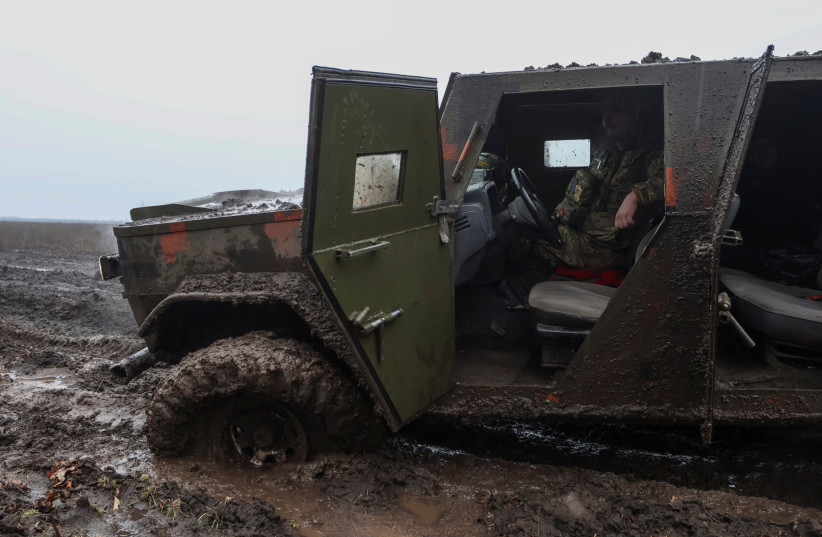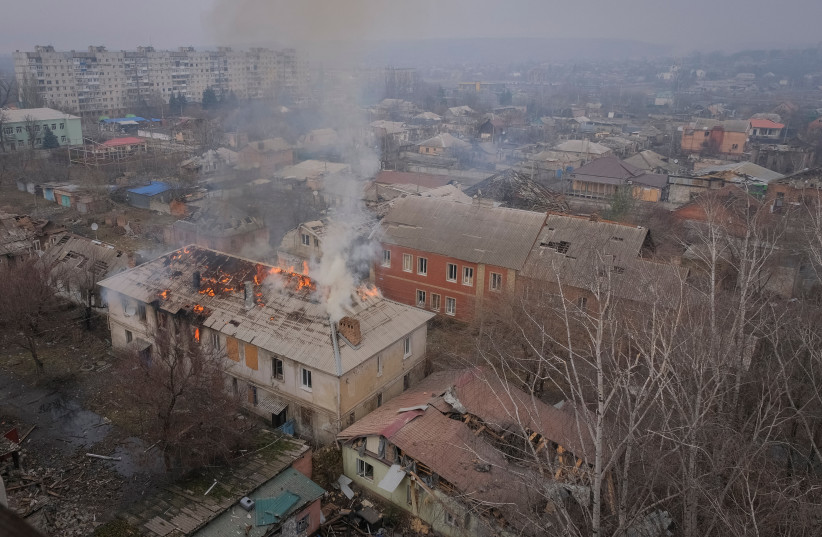Russian forces carried out relentless attacks on Bakhmut on Wednesday, trying to encircle and storm the small eastern Ukrainian city and claim their first major prize for more than half a year after some of the bloodiest fighting of the war.
Ukrainian President Volodymyr Zelensky accused Moscow of throwing waves of men into battle in Bakhmut with no regard for their lives, and said the fighting was "most difficult" but the city's defense essential.
Ukrainian resistance
The leader of Russia's Wagner mercenary group said the Ukrainians were putting up "furious resistance" trying to hold the city at all costs.
Russia also said it had repelled a massive drone attack on Crimea, the peninsula its forces seized from Ukraine and claimed to annex in 2014. On Tuesday Moscow accused Kyiv of launching a series of drone strikes on targets in Russia itself.
Reuters was able to reach Bakhmut from the west on Monday - proof the city was not yet surrounded despite Russian forces pressing from north and south to close the last access routes.

Flames and smoke rose into the sky from blazing buildings. Constant gunfire and explosions rang out into the sky. Ukrainian armored vehicles roared through the streets, while stray dogs wandered amid the mud and debris.
A Ukrainian soldier said in a video he posted on Wednesday on messaging app Telegram that it was "a bit calmer" in Bakhmut.
"We (have) silenced the enemy a bit...There's a gunfight on the outskirts. A few explosions, shells flying," serviceman and vlogger Andrii Babychev said, blasts reverberating behind him.
"But we are standing in Bakhmut. Nobody plans to withdraw anywhere at the moment. We're standing. Bakhmut is Ukraine. Glory to Ukraine!" he said.
Reuters was able to confirm the location as Bakhmut from the look of the buildings in the video, which matched file pictures, though not that the video was filmed on Wednesday.
Only a few thousand residents remain inside the ruined city from a pre-war population of around 70,000.
"It is frightening indeed," said a middle-aged man bundled in a coat and wooly hat on the steps of his apartment block.
"I can hardly move my legs - they barely move - from the stress of the situation. As long as my home is intact and I am not hurt, I will stay here."
In the town of Chasiv Yar just to the west, a grocery store was ablaze.
Bitter fighting
The area around Bakhmut has been the one segment of the front where Moscow has made notable gains during a winter offensive that has seen what both sides describe as the deadliest fighting of the war.
In an audio message on social media, Yevgeny Prigozhin, whose Wagner private army has led Russia's offensive there, said the Ukrainian military was throwing extra reserves into the battle, "trying to hold the town with all their strength."
"Tens of thousands of Ukrainian army fighters are putting up furious resistance. The bloodiness of the battles is growing by the day," Prigozhin said.
"The bloodiness of the battles is growing by the day."
Yevgeny Prigozhin
Since being ousted from some territory in the second half of 2022, Russian forces have been replenished by hundreds of thousands of reservists. Ukraine, for its part, has stuck mainly to defense over the past three months, hoping Russia's assault will exhaust its forces before Kyiv launches a counter-attack with new heavy weapons promised by the West.
Russia says seizing Bakhmut would open the way to fully capturing the rest of the surrounding Donbas industrial region, one of its main war objectives. Kyiv says the ruined city has limited strategic value but the losses have been so huge they could influence the future course of the war.
Wagner has recruited tens of thousands of convicts from prisons for fighting in Ukraine and its boss Prigozhin has accused the regular Russian military brass of treason for inadequately supplying his men.
Wagner received an apparent show of Kremlin support on Wednesday when Russia's rubber-stamp lower house of parliament, the State Duma, discussed extending censorship laws to include a 15-year jail sentence for those who discredit "volunteer formations."

The start of spring
Ukrainians and Russians traditionally view March 1 as the start of spring. Already, frozen ground has melted at the front, ushering in the season of sucking black mud - "bezdorizhzhia" in Ukrainian, "rasputitsa" in Russian - that has been notorious in military history for destroying attacking armies in the region.
Ukrainians declared that the arrival of milder weather proved Russia had failed to "freeze" them into submission with missile and drone attacks on energy infrastructure.
"They wanted to freeze us and throw us into darkness. We survived! Today is the first day of spring. Life, light, love defeat death. Ukraine will win," Defence Minister Oleksii Reznikov tweeted.
